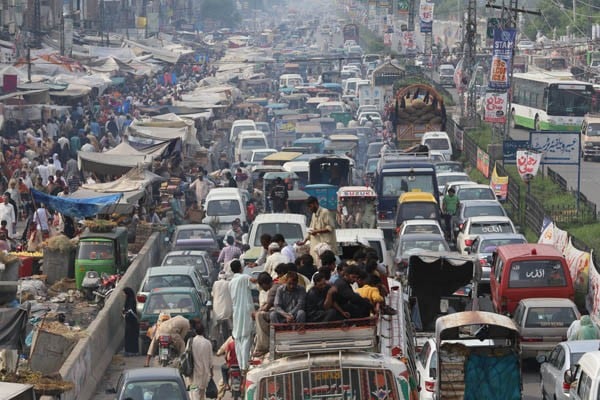

Lahore has probably the worst traffic in the country after Karachi. The congestion on the main transport routes in the city is increasing by the year as people continue to move to the city for economic opportunities and the relative security it offers compared to some other parts of the country. Property prices are soaring and the suburbs are expanding at an ever faster rate. Yet the traffic along the central parts of the city shows no sign of relaxing.
The traffic police reforms during the Chief Ministership of Chaudhry Pervaiz Elahi provided some cosmetic changes to a much larger problem. New traffic wardens were hired with better salaries and distinct uniforms. They were required to be college graduates and were hired at a higher rank. The result was improved enforcement of traffic laws and road discipline. However, the underlying problem of road congestion continues to worsen and threatens to undermine the positive changes.
Sufyan who drives a motorcycle and is also a government employee says that traffic wardens behave well towards the public and generally do not misuse their powers. "However, our public is difficult to control," he says.
The consensus seems to be that traffic wardens alone cannot successfully manage Lahore’s traffic woes. Other government departments also need to do their bit to manage urban planning and deterrence.
Khawaja Khalid Farooq, former DIG Traffic Punjab, feels that road engineering needs further improvement and better deterrence strategies are needed.
"Road design and engineering has improved over the course of time yet in many parts of the city it continues to be a problem. Road engineering is not just about expanding the width of roads. There are many other factors which allow traffic to move smoothly," he says.
In addition, deterrence strategies from the traffic police ought to be stricter and should make use of technology, he says.
"In Western countries, repeated violations lead to suspension of your license. Also, it is a waste of resources that two or three traffic wardens of Sub-Inspector rank are manning signals in posh areas when technological solutions can be used for deterrence as well as traffic management."
"A command and control centre comprised of concealed cameras ought to be used to detect and trace traffic violators. Many traffic violations take place when citizens think they can get away with breaking traffic laws."
These solutions are worth pondering over but their level of effectiveness can be questioned. Electricity is not a guaranteed commodity in Pakistan for one and most technological solutions are unlikely to be reliable without a steady supply of electricity. Old and impoverished parts of the city have their own distinct problems as Farooq himself admitted and require different solutions. There is no doubt that some of these ideas can improve the traffic situation to some degree but we might need to analyze how our cities are built in order to identify a long term solution.
Rafay Alam, a lawyer and an environmentalist, thinks the real solution is more radical. "Get rid of cars," he says. On the surface this seems a strange proposal. The economically privileged classes in the country have become entirely dependent on cars to move about. If misconstrued his statement could look like an attack on our lifestyle. But consider this.
"Eight percent of Lahore residents use cars and the entire transport network is built around their needs," he adds. "Our entire urban development is done in a manner in which we need a car to get any and all of our shopping done. Even for a bag of eggs we need to take out our cars because we live in large residential estates and the markets are located at some distance from our homes."
Historically, Lahore’s urban development was based on a different ethos, claims Rafay.
"People lived in apartments with shared verandas and shops were located on the ground floors. That is still true for many modern cities such as Tokyo or New York. It is unimaginable in these cities for anyone to own a garden unless they are millionaires."
"In Lahore, our transport options are limited. Going by foot, bicycle, bus or rail is either impossible or quite dangerous.
In Gulberg, there are several markets and you need cars or motorcycles to travel between them. There is no concept of taking a bus to one part of the city and being able to do all your shopping on foot because our cities are not built that way."
These solutions require a radical rethink in our bureaucratic circles, one that I am not sure they are capable of at this time. Yet no complex solutions are arrived at with just a few politically expedient and haphazard projects. The answers require coherent long term policy planning as well as coordinated efforts at implementation.